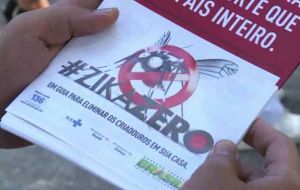MercoPress. South Atlantic News Agency
President Rousseff with 200.000 troops leads the “Zika Zero” campaign
 Aiming to reach 3 million families soldiers visited homes, parks and shopping malls in 350 cities with instructions on how to prevent accumulation of stagnant water
Aiming to reach 3 million families soldiers visited homes, parks and shopping malls in 350 cities with instructions on how to prevent accumulation of stagnant water  ZikaZero, is part of a larger campaign by public health officials and the military to inspect buildings for stagnant water and treat potential breeding grounds
ZikaZero, is part of a larger campaign by public health officials and the military to inspect buildings for stagnant water and treat potential breeding grounds  “In the past, we won the war against yellow fever, and we are going to win the war against the Zika virus,” Rousseff told reporters.
“In the past, we won the war against yellow fever, and we are going to win the war against the Zika virus,” Rousseff told reporters. More than 200,000 troops fanned out across Brazil over the weekend to raise awareness about the mosquito that spreads the Zika virus, which has been linked to a surge in birth defects.
Aiming to reach 3 million families in a major effort, soldiers visited homes, parks and shopping malls in 350 cities, passing out pamphlets with instructions on how to prevent the accumulation of stagnant water, where the Aedes aegypti mosquito breeds.
The effort, branded #ZikaZero, is part of a larger campaign by public health officials and the military to inspect buildings for stagnant water and treat potential breeding grounds with insecticides.
Marcelo Castro, Brazil’s health minister, said that the government is “absolutely sure” that Zika is behind the country’s recent jump in cases of microcephaly, a condition where babies are born with unusually small heads. According to official statistics, 41 cases of microcephaly have been tied to Zika, and more than 3,800 cases are being investigated. As many as 1.5 million Brazilians may have been infected with the Zika virus.
Although the World Health Organization has yet to establish a definitive link between the virus and the rare birth defect, it is advising pregnant women to consider delaying travel to Brazil and other Latin American countries where the virus has spread. The outbreak also has raised questions about the safety of tourists and athletes at the Olympic Games, which will be held in Rio de Janeiro in August.
Highlighting these concerns, Brazilian President Dilma Rousseff joined health officials in Rio as they swept through the cinder-block shacks of a favela — one of the country’s many informal settlements typically marked by poor infrastructure and scant public services. Because they allow standing water to collect, these are ideal conditions for the Aedes aegypti to reproduce.
“In the past, we won the war against yellow fever, and we are going to win the war against the Zika virus,” Rousseff told reporters. “We’re trying to catch up after decades of abandonment in terms of sanitation.”
However according to Trata Brasil, a nonprofit organization that studies sanitation, fewer than half of Brazilians live in homes hooked up to sewage lines, and 35 million lack access to clean drinking water. Last year, the country reported 1.6 million probable cases of dengue, a virus also transmitted by the Aedes aegypti mosquito.
“The red flags were already there,” Marta Suplicy, a senator who recently left Rousseff’s party, said in an editorial published Friday. “The federal government is deploying the Armed Forces to assist in the fight against the mosquito that transmits the [Zika] virus. Very good. But the issue is deeper: If we don’t solve the structural problems, we will keep suffering setbacks.”
Luciano Pamplona, a biologist and the secretary-general of the Brazilian Society of Dengue and Arboviruses, estimates that as many as 90% of mosquito breeding grounds can be found in people’s homes.
“Just the media impact is worth the trouble,” Pamplona said. “Unfortunately, it’s not an ongoing effort. People have to understand that we can’t allow mosquitoes in our homes. Until we internalize that, we’ll keep having epidemics.”




Top Comments
Disclaimer & comment rules-

-

-

Read all commentsWhy is Zika, which has been established in South East Asia since 1945 and Indonesia has documented outbreaks since the late 70s, not seemed to cause microcephaly there?
Feb 16th, 2016 - 08:30 am 0Is this a different strain? Will neighbouring countries suffer this? It's moved into the US already!
Perhaps microcephaly is not caused by the Zika virus.....in the N.East of Brazil, where most of the Zika cases are reportedly occurring, the native population ( generally referred to as 'cabeças chatas' = 'flat-heads') has been known for having small brains for as long as I can remember.
Feb 16th, 2016 - 02:34 pm 0A good example of this is the BRasshole, who although living in Curitiba, comes from the N.East. LOL......
There are several candidates to what causes microcephaly: Zika virus, a mutation of this virus (vira mutate easily and fast), the insecticide Pyriproxyfen, which has been added to the drinking water in some Brasilian states, a combination of factors, or perhaps heavy alcohol abuse during early pregnancy, which is known to cause microcephaly in some cases, ... nobody knows, although eg. WHO claims to know it isn't the pesticide - dumb buggers - nobody knows.
Feb 16th, 2016 - 10:51 pm 0Commenting for this story is now closed.
If you have a Facebook account, become a fan and comment on our Facebook Page!